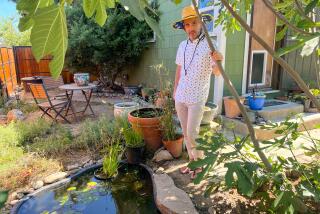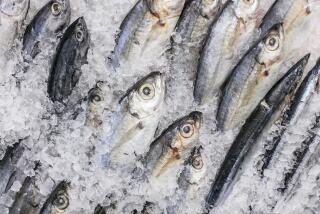Welcome to Florida, the Goldfish State : Aquaculture: In this mecca of tropical fish farming, the small players who are the backbone of the industry are finding smarter ways to make fish.
- Share via
GIBSONTON, Fla. — From inside the nation’s fishbowl, watching all those goldfish, guppies and swordtails isn’t always a relaxing pastime.
“It’s a tricky business,” tropical fish farmer Tim Hennessy said as he stood in his pond-dotted pasture. “Anybody who’s ever taken care of fish knows that if everything isn’t just right, they can die.”
Vulnerability aside, fish farming has thrived in Florida, which produces about 95% of all tropical fish sold in North America. Sales have more than doubled in the past six years, to $46.7 million in 1993.
Even so, the industry remains largely a collection of small farmers who are just beginning to find smarter ways of making better fish.
*
It all started in the 1940s amid the balmy weather and tropical breezes of Miami. Farmers found digging ponds in the coral rock too difficult and building above-ground ponds too expensive, so the industry gravitated to the Tampa Bay area, where the mild climate, high water table and sandy soil were perfect for building small tropical fish ponds.
One example of the area’s success is Hennessy’s EkkWill Water Life Resources, a 240-acre, 800-pond complex south of Tampa. It is a far cry from a run-of-the-mill fish farm.
The industry has traditionally been rooted in 20-acre-or-less, family-owned farms that rely on traditional methods, said Craig Watson, a University of Florida aquaculture specialist. It got a wake-up call, however, during a 1989 Christmas freeze that wiped out 70% of tropical fish stocks.
Most of the losses occurred in ponds exposed to the cold; those covered by thick, plastic tents that warm the water suffered only a 2% loss. Watson said the industry faces a similar jolt as farmers deal with a five-year drought that has water managers pressuring them to conserve.
“Technology,” he said, “is going to have to be the answer.”
Technology is EkkWill’s strength. A computer drives every aspect of the operation, from the harvesting of fish eggs to the packing of trucks. A complex water filtration system uses mechanical and biological filters to recycle 1.5 million gallons a day.
High-tech genetic engineering, covered ponds and aeration systems help fish grow even at high densities.
“We’ve taken it to the next level,” said Hennessy, whose business ships 6 million fish a month and boasts sales of $10 million a year.
*
A tour of the main plant tells the story. It begins in a covered facility where breeder fish spawn in darkness and eggs are hatched. A hydraulic press splits the chromosomes in the eggs to yield fish that can’t reproduce and therefore grow faster. It can also be used to clone specific traits.
Once hatchlings are strong enough, they are moved to a checkerboard layout of small rectangular ponds, where as many as 100,000 fish live for three to 18 months. Every factor is regulated, from water temperature to the type of feed to the oxygen level in the water.
When the fish reach market size, they are scooped out of the ponds and placed in holding tanks, where they are sorted for shipment.
An assembly-line crew keeps an eye on a posted computer printout that tells workers how quickly they must pack the fish to make scheduled airline flights.
EkkWill, which produces 140 types of fish but boosts its product line to more than 700 items by buying from smaller growers, sells exclusively to pet store suppliers. A typical molly goes for about 20 cents wholesale; it is marked up six to eight times by the time it is sold in a pet store.
“This is a business of pennies, not a business of dollars,” said Mike Hennessy, Tim’s brother and the company’s treasurer.
“There’s nothing easy about it,” said David Boozer, executive director of Florida’s Tropical Fish Farmer’s Assn. “This is not like a citrus grove you can go out and check on every now and then. It’s like any livestock--a seven-day-a-week, 365-day-a-year job.”
More to Read
Sign up for The Wild
We’ll help you find the best places to hike, bike and run, as well as the perfect silent spots for meditation and yoga.
You may occasionally receive promotional content from the Los Angeles Times.






